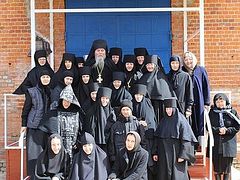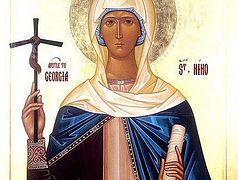Just recently I listened again to a bit of theology offered in a lovely old song by (the often under-rated) Jennifer Warnes, “It Goes Like It Goes”, written by David Shire and Norman Gimbel which featured in the 1979 film Norma Rae. The opening line told me that “Ain’t no miracle bein’ born—people doin’ it every day”. The idea was that the oft-trumpeted “miracle of birth” was not miraculous at all. It couldn’t be a miracle, since it was so commonplace. Miracles were, by definition, rare events and the frequency of the event happening every day therefore disqualified it from being a miracle. But with respect to the talents of Shire and Gimbel and the lovely Miss Warnes, they are profoundly wrong.
We sometimes have the idea that God stands outside His creation, peaking down into it and occasionally interfering with the world He made by temporarily suspending its natural and physical laws to create a miracle. There is some truth in this picture, as there is some truth in practically everything. It does preserve the concept of God’s transcendence, much insisted upon by the Law and the Prophets. The pagan deities might have been to all intents and purposes identified with the forces of fertility and nature (hence deities coming in both genders, so that gods had their consort goddesses), but the Deity of the Hebrews was different. He was not to be identified with the forces of natural fertility but was the Creator of those forces, and stood at a distance from them even as an author stood at a distance from the book he created. The Hebrew God also stood outside of time, which He was how He could tell His prophets what would happen in the future. For God does not foresee events as men might foresee events. Being above time, He simply sees events, for He is the First and the Last, the One who knows the beginning and the end (Isaiah 44:6, 46:10).
That said, we must still insist that God is intimately involved in His creation. One person, reacting to the pagan idea of pan-theism (i.e. everything is divine) coined the term “pan-entheism”—i.e. God is ineverything. If I read St. Maximus aright, he said pretty much the same thing when he talked about the logoiin all created things uniting them with the divine Logos. It is true that God is radically transcendent from His creation. But it is also true that He is radically immanent, and involved in the day to day workings of His creation. When St. Paul wrote that it was in Christ that all things in creation held together (Colossians 1:17) he was saying the same thing too, which is presumably where St. Maximus got his own insights about it.
In one sense therefore the act of creation is still ongoing. For though God finished His work of creation and then entered into His rest on the seventh day so that His works were finished from the foundation of the world (Genesis 2:2, Hebrews 4:3), He also continues to create, sending out His Spirit so that nature is re-created anew every spring (Psalm 104:30). God does not peer into the world from afar like an absentee landlord or like William Paley’s famous watch-maker. He continues to work and live in His creation and uphold it by the word of His power (Hebrews 1:3). We talk blithely about the laws of nature as if the consistency of those laws somehow proved the non-existence of God, or at least that it argued that His involvement in the world was superfluous and unnecessary. But talk like this presupposes a very primitive and unsophisticated view of God, and makes Him into something rather like Paley’s watch-maker. God is not a God of the gaps, as some have suggested—He is not a deity like the one some apologists drag in to explain the (increasingly shrinking) unexplainable. The laws of nature do not testify to God’s non-existence, but to His loving faithfulness. The devil, as they say, may be in the details, but God is in everything—including the laws of nature. Those laws and the things which our scientists discover and document are the logoi through which the Logos works in His world.
Chesterton saw this some time ago. In his book Orthodoxy, he wrote, “It is no argument for unalterable law (as Huxley fancied) that we count on the ordinary course of things. We do not count on it; we bet on it. We risk the remote possibility of a miracle…We leave it out of account, not because it is a miracle and therefore an impossibility, but because it is a miracle and therefore an exception…All the towering materialism which dominates the modern mind rests ultimately upon one assumption; a false assumption. It is supposed that if a thing goes on repeating itself it is probably dead; a piece of clockwork. People feel that if the universe was personal it would vary. This is a fallacy even in relation to known fact…Grown-up people are not strong enough to exult in monotony. But perhaps God is strong enough to exult in monotony. It is possible that God says every morning, ‘Do it again’ to the sun, and every evening, ‘Do it again’ to the moon. It may not be automatic necessity that makes all daisies alike; it may be that God makes every daisy separately, but has never got tired of making them…The repetition in Nature may not be a mere recurrence; it may be a theatrical encore”.
Chesterton of course is speaking in his native tongue of poetry and paradox. But stripped of the poetry and paradox he is saying what all Christian thinkers have said from the days of St. Paul to St. Maximus, that there is a mind and a will co-inhering with the forces of nature and giving it faithful stability. What scientists discover is not so much the iron law of necessity, but God’s faithfulness to His original blueprint.
And this is not of merely theoretical significance. If it is true, that as Chesterton says, that God makes every daisy, then it is also equally true He makes every person. Scientifically each person was created by the work of mommy and daddy; theologically each person was created by the love of God. And this means that each person bears a tremendous weight of dignity and value, since each person is the handiwork of the Trinity, and (as someone once said) God does not make junk. It is a mistake to think in terms of each person having human rights; better to say that they have a divine Father, One who is grieved when His children are abused and denied justice. The concept of human rights is rooted in politics and therefore partakes of all the ambiguity that attends merely political realities—as we learn when different human rights are seen to be in conflict. The concept of human dignity as rooted in God is not subject to such ambiguity and contradiction. Political justice is fine, but love is finer still, and we have been taught that mercy triumphs over judgment.
I do love the music of Jennifer Warnes, but I love the music of the Church even more, for the latter has the better theology. “Ain’t no miracle bein’ born”? Actually, it is a miracle, because all human birth is the work of a divine Creator, and He indeed does it every day. It should not surprise us to find God so intimately connected with His creation and to multiply miracles in the world. He once came down from heaven to become one of His creatures and to multiply miracles for a few years in Galilee and Judea. To quote a wise man, “The miracles done by God incarnate, living as a man in Palestine, perform the very same things as this whole activity [of God in nature], but at a different speed and on a smaller scale. One of their chief purposes is that men, having seen a thing done by personal power on the small scale, may recognize, when they see the same thing done on the large scale, that the power behind it is also personal.” We are each of us the work of God. That is why we should treat each other with love and respect. We are each of us the result of a miracle.
Used with permission.






